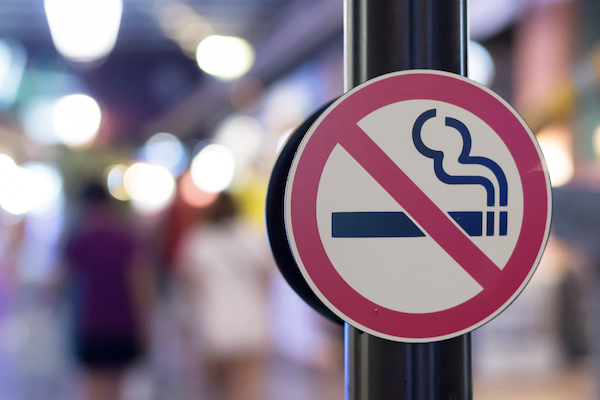THIS BLOG FROM CANCER RESEARCH UK IS PART OF OUR MEMBER-AUTHORED SERIES ON NCD INVESTMENT.
With 1.3 billion smokers globally, tobacco kills more than 8 million people each year, mainly through chronic noncommunicable diseases (NCDs) like cancer, cardiovascular disease and chronic respiratory diseases. More than 7 million of those deaths are the result of direct tobacco use while around 1.2 million are the result of non-smokers being exposed to second-hand smoke. This means that about 15% of all deaths globally are caused by tobacco - a preventable risk factor.
Governments need to protect people from tobacco and the aggressive marketing strategies used by the tobacco industry. According to the WHO Framework Convention on Tobacco Control (FCTC), the most effective tool for reducing the use of tobacco is taxing tobacco products. For every 10% increase in the cost of tobacco, there is a decrease in consumption of between 4-8%.
However, implementing tobacco control policy is difficult - in 2021, only 38 of the 181 FCTC parties had established a tax at the WHO’s minimum threshold of 75%. The main barrier is the powerful opposition governments face from the tobacco industry, which takes advantage of knowledge gaps among policymakers and a lack of data on the benefits of tobacco control, filling these with misinformation that is funded by the industry itself.
Knowledge is power: pushing back against the tobacco industry
The University of Cape Town (UCT), with support from Cancer Research UK (CRUK), works to fill this information gap, supporting governments in low-and middle-income countries (LMICs) to generate data and understand the positive impact that taxing tobacco will have on the health of their citizens, national economies, and society more widely. Designated the WHO FCTC Knowledge Hub on Tobacco Taxation, the UCT aims to ensure governments can be confident in the positive policy changes they make and resist the tactics of the tobacco industry.
For instance, the tobacco industry commonly uses a fear tactic to discourage politicians from implementing higher tobacco taxes, claiming that this would lead to an upsurge of illicit trade which in turn would undermine the public health effect of the tobacco tax and generate losses in tobacco tax revenues. They support this argument with overestimates of the size of the illicit cigarette market.
Through extensive research via the FCTC Knowledge Hub, UCT demonstrated that in four diverse countries - Gambia, Georgia, Mongolia and South Africa - industry estimates of the illicit tobacco market after tobacco tax implementation are severely inflated, and that the increase in reality is low and often negligible. For example, in Mongolia, the share of illicit cigarettes declined despite government increasing both import and excise tobacco tax. The studies further showed that other factors influence more heavily on the illicit tobacco market.
More recently, CRUK has been supporting the work of the FCTC Knowledge Hub that is designed to help policymakers and government officials from FCTC parties implement tobacco taxation. This includes comprehensive tobacco tax workshops on the economics of tobacco control and tobacco tax simulation modelling. This work is crucial to getting tobacco use - and the tobacco industry - under control.
A call to action: Increasing revenue, improving health
The human and economic cost of tobacco could not be clearer: In 2021, tobacco caused an estimated $1.4 trillion in health care costs, lost productivity, fire damage, environmental harm from cigarette litter and destructive farming practices. These effects are being felt the most in the low-and middle-income countries that are targeted by the tobacco industry to grow tobacco and establish new markets. This means that tobacco plays a major role in perpetuating poverty and widening health and socioeconomic inequalities.
The funding needed to implement FCTC tobacco control measures is estimated at $27.4 billion - this figure is dwarfed by the costs of the damage tobacco causes. It is crucial that this revenue is invested to prevent tobacco use, manage the consequences of the tobacco burden and ensure that health systems are equipped to treat the NCDs that tobacco use is causing.
Introducing tobacco tax also generates income which can be earmarked for investment into healthcare systems, helping to alleviate some of the burden caused by tobacco-attributable diseases. Between 2016 and 2018, Colombia tripled their tobacco tax rates, resulting in a fall in cigarette consumption of 34% and a doubling of earmarked funding for universal health coverage. In 2018, excise taxes on cigarettes generated $162 billion for LMICs.
Between 2007 and 2014, effective implementation of the FCTC led to approximately 22 million premature and smoking attributable deaths being averted globally. This Global Week for NCDs, we are calling on governments to invest more and commit further to implementing the FCTC, especially Article 6 which calls for effective tobacco tax policy. This will reduce tobacco use and generate revenue which can strengthen healthcare systems. By doing so, billions of people will be protected from the devastating impacts of tobacco, the burden of NCDs will be reduced, and societies will benefit from revenue being invested to create resilient healthcare systems.
About the authors
Zunda Chisha is the acting Program Director of the WHO FCTC Knowledge Hub on Tobacco Taxation. He is also a research officer with the Research Unit on the Economics of Excisable Products (REEP), where he has been involved in various research projects and published research on illicit trade and taxation in the Gambia, smoking-related income inequality in Namibia, and tobacco product substitution in Zambia, among others.
Beth Turner is a policy adviser at Cancer Research UK, specialising in global tobacco control. An experienced global health and international development professional, she works with research partners and civil society organisations to advocate for increases in tobacco taxes and support the implementation of the World Health Organization's Framework Convention on Tobacco Control around the globe.




